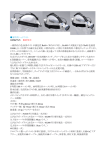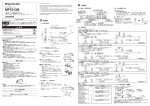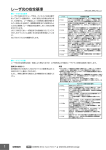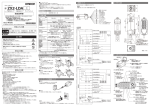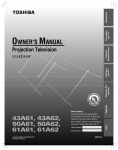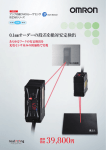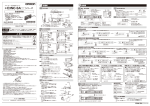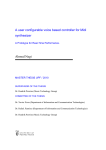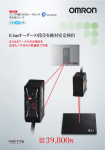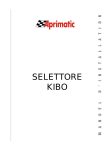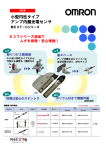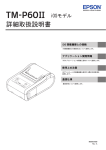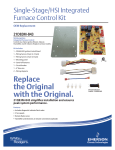Download ZX1-LD - Omron
Transcript
3.米国を除く諸外国へ輸出する場合 米国以外の地域については、警告ラベルまたは説明ラベルを付属品の英文ラベルに貼替えてください。 スマートセンサ ZX1-LD□□ ・形ZX1-LD□□Lセンサ 説明ラベル 分解しないでください。分解すると、 レーザ光がもれ出し視力障害を 起こす恐れがあります。 レーザに関する警告ラベルまたは説明ラベルをセンサ側面に貼っています。 ・形ZX1-LD□□Lセンサ 説明ラベル レーザ光 ビームをのぞきこまないこと クラス2レーザ製品 Max. 1.0mW 2.5ms 半導体レーザ 660nm JIS C 6802 : 2011 ・FDA証明ラベル ・ラベルを貼る位置 ・形ZX1-LD□□ レーザ警告ラベル ・形ZX1-LD□□L 説明ラベル FDA証明ラベル パッケージ内容の確認 -1- 14.23 10.5 2.4 3.2 37.8 52.5 46.1 16.7 42.3 A* 10.2 11.7 ■形ZX1-LD300□/形ZX1-LD600□ 13.6 1-3 ビニール絶縁丸型ロボットコード φ6.5 9芯(導体断面積0.125mm2/絶縁体径φ0.7mm) 標準長さ2m 根元部曲げ不可長さ:0mm 最小曲げ半径:39mm 投光中心位置マーク *形ZX1-LD50□の場合、L=50、A=21° 形ZX1-LD100□の場合、L=100、A=11.5° コード色 投光中心位置マーク 投光軸 基準面 1.9 50.1 27.2 4.5 45.6 2-φ4.5 (取り付け穴) 21.3 基準面 配線について 外部入出力の各コードの機能は次のとおりです。 3 3 基準面 名称 受光軸 50.3 57 66 投光軸 ・センサ 1台 ・取扱説明書(本書) 各1部(日本語、英語) ・FDA証明ラベル 1枚 ・レーザ警告ラベル 各1枚(和文、英文) (形ZX1-LD□□Lにはレーザ警告ラベルの代わりに説明ラベルが付属します) 13.6 投光中心 L* 15.5 ビニール絶縁丸型ロボットコード φ6.5 9芯(導体断面積0.125mm2/絶縁体径φ0.7mm) 標準長さ2m 根元部曲げ不可長さ:0mm 最小曲げ半径:39mm 投光中心位置マーク *形ZX1-LD300の場合、L=300,A=6.6° 形ZX1-LD600の場合、L=600,A=3.4° <コネクタ中継タイプの場合> 電源 DC10∼30V(リップル(p-p)10%含む)の電源を接続します。 PNPタイプの場合、 アナログ出力以外の入出力のコモン端子となります。 青 GND 電源用0V接続線です。NPNタイプの場合、アナログ出力 以外の入出力のコモン端子となります。 白 緑 OUT1判定出力 CH1の判定結果を出力します。 OUT2判定出力 CH2の判定結果を出力します。 黒 アナログ出力 測定の結果に応じた電流を出力します。(4∼20mA) 橙 桃 紫 TUNE1入力 チューニングをCH1に対して行います。 TUNE2入力 チューニングをCH2に対して行います。 ゼロリセット入力 ゼロリセットの実行、または解除を行います。 赤 LD-OFF入力 ON状態にするとレーザ点灯(発光)が停止します。 この状態では、アナログ出力、デジタル表示、判定出力、 判定出力表示はキープ機能の設定にしたがって出力します。 表示 ・コード引き出しタイプとコネクタ中継タイプの各コード色、機能は同様です。 配線は正しく行ってください。空き線は絶縁処理してください。故障の原因になります。 ■形ZX1-LD50□□6/形ZX1-LD100□□6 形ZX1-LD300□□6/形ZX1-LD600□□6 <延長コード> 機能 茶 アナログ出力用0V接続線です。 シールド アナログGND 青(OV)のGNDとは分離して接続してください。 【重要】アナログ出力を使用しない場合でも、必ず青(0V)に接続してください。 17 10.1 段差部で、異常な値を 検出する場合があります。 *レーザ光が反射しにくいように壁面をつや消しの色で塗るか、背景除去機能をON設定にして、 チューニングを実施し試してください。 「④詳細設定編 5. 背景除去機能」 7 投光中心 L* ■入出力段回路図<NPNタイプ> 茶 DC10∼30V ビニール絶縁丸型ロボットコード φ6.5 9芯(導体断面積0.125mm2/絶縁体径φ0.7mm) 標準長さ0.5m センサ根元部曲げ不可長さ:0mm コネクタ部曲げ不可長さ:40mm 最小曲げ半径:39mm 39.8 37.3 負 荷 白 OUT1 判定出力 負 荷 DC10∼30V 緑 OUT2 判定出力 青 GND (0V) L* 橙 TUNE1入力 内 部 回 路 *L長さは以下の通りです。 形ZX0-XC10R:10m、形ZX0-XC20R:20m 桃 TUNE2入力 紫 ゼロリセット入力 赤 LD-OFF 入力 延長コードはセンサ本体のコード同様にロボットコードになります。 1-2 電流出力 4∼20mA センサの取り付け 形ZX1-LD50□,形ZX1-LD100□はM3ネジ(締め付けトルク:0.5N・m)で、形ZX1-LD300□,形 ZX1-LD600□はM4ネジ(締め付けトルク:1.2N・m)で確実に取り付けてください。 黒 アナログ出力 シールド アナログGND 負荷 300Ω以下 ■入出力段回路図<PNPタイプ> <取り付け穴寸法(単位:mm)> 茶 DC10∼30V 投光部・受光部方向 基準面 基準面 3 2-M 0.5 P= 23.6±0.1 35.3±0.1 形ZX1-LD50□ 形ZX1-LD100□ 4.5±0.1 レーザが直接、 または鏡面の物体に反射して、 目に入らないように ご注意ください。 レーザから放射されたレーザ光はパワー密度が高 く、 目にはいると失明する恐れがあります。 10.1 基準面 4 2-M 0.7 P= 基準面 白 OUT1 判定出力 緑 OUT2 判定出力 DC 10∼30V 負 荷 負 荷 青 GND (0V) 61.5±0.1 警告 段差部でも安定した検出が 可能です。 投光軸 3.2±0.1 ・形ZX1-LD□□センサ:クラス2 / 形ZX1-LD□□Lセンサ:クラス1 2.米国へ輸出する場合 本装置を機器に搭載して米国へ輸出する場合、 米国FDA(Food and Drug Administrarionの 規制)のレーザ規制を受けます。形ZX1シリーズ は、本規格のLaser Notice NO.50の規定に 従いIEC/EN60825-1の基準にてClass1また はClass2に分類され、CDRH(Center for Devices and Radiological Health)に届出済 みです。 Accession Number (形ZX1-LD□□ : 1210041-000) (形ZX1-LD□□L : 1210041-001) 米国へ輸出の際は、警告ラベルまたは説明ラベ ルを付属品の英文ラベルに貼替えるとともに FDA証明ラベルを右図に示している位置に正 しく貼ってください。 使用上の注意 製品が動作不能、誤動作、 または性能・機器への悪影響を防ぐため、以下のことを守ってください。 ■設置場所について 次のような場所には設置しないでください ・周囲温度が定格の範囲を越える場所 ・急激な温度変化により、結露が発生する場所 ・相対湿度が35∼85%RHの範囲を超える場所 ・腐食性ガス、可燃性ガスがある場所 ・塵埃、塩分、鉄粉がある場所 ・振動や衝撃が直接加わる場所 ・強い外乱光 (レーザ光、 アーク溶接光など) があたる場所 ・直射日光があたる場所や暖房器具のそば ・水・油・化学薬品の飛沫がある場所 ・強磁界、強電界がある場所 ・水中・降雨中および屋外 ■電源および配線について ・センサの入出力線の配線を確認してから電源を供給してください。 ・市販のスイッチングレギュレータをご使用の際は、FG端子を接地してください。 ・電源ラインにサージがある場合、使用環境に応じてサージアブソーバを接続してご使用ください。 ・配線後は電源を投入する前に、電源の正誤、負荷短絡などの誤接続の有無、負荷電流の適否 について確認を行ってください。誤配線などで故障するおそれがあります。 ・コードの延長は別売の延長コード (ZX0-XC□R) をご使用ください。 またいずれか1本のみでご使 用ください。 センサのコードの延長は全長で20m以内としてください。 ・電源投入から約2.5秒後に表示・点灯します。 ■ウォームアップについて ・電源投入後、30分以上経過してからご使用ください。電源投入直後は回路が安定していません ので計測値が徐々に変化することがあります。 また、長時間LD-OFFを使用した場合も LD-OFF解除後に30分以上のウォームアップを行ってください。 ■保守点検について ・調整や着脱を行う場合は、必ず電源を切ってから作業をしてください。 ・清掃には、 シンナー、 ベンジン、 アセトン、灯油類は使用しないでください。 ・センサ前面のガラス面に、大きなゴミやホコリが付いた場合は、 ブロアブラシ(カメラレンズ用)で吹き飛 ばしてください。呼気で吹き飛ばすことは避けてください。小さなゴミやホコリは柔らかい布(レンズク リーナーなど)にアルコールを少量含ませて、 ていねいにふき取ってください。強くふくことは避けてく ださい。 ガラス面に傷がつくと、誤差の原因になります。 ■対象物について 対象物の材質・形状によって、測定できない場合や精度が出ない場合があります。 (透明な部材、 反射率の極端に小さな材質。 スポット径よりも小さな対象物、曲率の大きな対象物、大きく傾斜した 対象物など) ● 警告表示 受光軸 49.3±0.1 1.国内で使用する場合 JIS C6802規格で、 レーザ製品のクラスに応じて使用者が行わなければならない安全予防対 策が規定されています。 2.5 10.2 レーザ機器に関しては、国内・外でレーザ安全対策が規定されています。国内で使用される場合、 国内にて組付けられて海外輸出される場合、 これらを3つのケースにわけて説明します。 18.7 基準面 15.1 A* レーザ製品を安全に使用していただくために 35.3 Ø 15.5 ●分解禁止 機器を分解することで、感電などの障害が起こる可能性を示します。 (取りつけ穴) 22 ●レーザ光線 レーザ光線による危害が生じる可能性を示します。 2-φ3.2 2 47 24.1 10.5 投光部や受光部をふさぐと 検出できません。 迷光の影響を受けやすく、 検出値がばらつく場合があります。* <段差のあるワークを検出する場合> 7 ● 図記号の意味 迷光の影響を受け にくくなります。 投光軸 Ø 15 正しい取扱いをしなければ、この危険のために、軽傷・中程度の 傷害を負ったり、万一の場合には重傷や死亡に至る恐れがありま す。また、同様に重大な物的損害をもたらす恐れがあります。 以下に示すような項目は安全を確保する上で必要なことですので必ず守ってください。 ■設置環境について ・引火性、爆発性ガスの環境では使用しないでください。 ・操作や保守の安全を確保するため、高電圧機器や動力機器から離して設置してください。 ■電源および配線について ・定格電圧 (DC10∼30V リップル (p-p) 10%含む) を越えて使用しないでください。 ・電源の逆接続および交流電源への接続はしないでください。 ・オープンコレクタ出力は、負荷を短絡させないでください。破損・発火の恐れがあります。 ・負荷の接続を正しく行ってください。負荷を短絡させると、破損・発火の恐れがあります。 ・負荷は定格以下でご使用ください。破損・発火の恐れがあります。 ・高圧線、動力線と当製品の配線は別配線としてください。同一配線あるいは同一ダクトにすると誘 導を受け、誤動作あるいは破損の原因になることがあります。 ・配線やコネクタを着脱するときは、必ず電源を切ってから行ってください。 ・原子力や人命にかかわる装置への安全回路には使用しないでください。 ・フェールセーフ回路などの安全対策を講じてください。 ■設置について ・取付けにおいて、 ねじの締め付けは規定のトルク以下で確実に行ってください。 規定のトルク M3:0.5N・m (ZX1-LD50□□/ZX1-LD100□□) M4:1.2N・m (ZX1-LD300□□/ZX1-LD600□□) ■その他 ・本体の分解、修理、改造、加圧変形、焼却などは絶対にしないでください。 ・廃棄するときは、産業廃棄物として処理してください。 ・万が一、異常を感じたときには、 すぐに使用を中止し、電源を切った上で、 当社支店・営業所までご 相談ください。 投光中心位置マーク 基準面 10.7 * 0 1 9 9 5 6 0 - 4 D * ● 警告表示の意味 警告 <穴の中の検出> (単位:mm) 安全上の要点 安全上のご注意 ・形ZX1-LD□□センサ レーザ警告ラベル <壁面付近での検出> ■ヨーロッパへの輸出 形ZX1-LD□□はEN60825-1規格に定めるClass2、 形ZX1-LD□□LはEN60825-1規格に定めるClass1に分類されます。 このたびは、本製品をお買い上げいただきまして、まことにありがとうございます。 ご使用に際しては、次の内容をお守りください。 ・ 電気の知識を有する専門家がお取り扱いください。 ・この取扱説明書をよくお読みになり、十分にご理解のうえ、正しくご使用ください。 ・この取扱説明書はいつでも参照できるよう大切に保管してください。 警告 外形寸法図 基準面 取扱説明書 2011 All Rights Reserved. 1-1 ■取り付け時の向きの注意点 ■形ZX1-LD50□/形ZX1-LD100□ レーザ変位センサ CMOSタイプ © OMRON Corporation 設置編 55.8 形 ・形ZX1-LD□□センサ レーザ警告ラベル (クラス2警告/レーザ放出開口ラベル) 1 橙 TUNE1入力 内 部 回 路 30.1±0.1 45.6±0.1 桃 TUNE2入力 紫 ゼロリセット入力 赤 LD-OFF 入力 形ZX1-LD300□ 形ZX1-LD600□ センサの投光部、受光部には触れないでください。指紋などが付着すると、正しく 測定できなくなります。誤って触れた場合は、使用上の注意の保守点検に従い、拭 き取ってください。 -2- 電流出力 4∼20mA 黒 アナログ出力 シールド アナログGND 負荷 300Ω以下 2 (1)しきい値を設定するチャンネルを切り替えたい ! 設定編 2-1 ● CH 設定モード 操作・表示早見表 1. 測定モードで 2. 【LD ON】 レーザ点灯 表示灯(緑) 【ST】 スマートチューニング表示灯(青) 【ZERO】 ゼロリセット表示灯(橙) 背景除去機能がON設定でチューニングを行ったときに 点灯します。 ゼロリセット設定時に点灯します。 【TUNE】 ボタン OUT1出力表示灯(橙) チューニングを実施します。 しきい値1を超えた場合、 もしくは、 しきい値1L∼1H 範囲内の場合に点灯します。 【DOWN】 ボタン しきい値や設定項目を 変更します。 UP/DOWN UP/DOWN ボタン + UP/DOWN 1. ワークがない状態で けます。 ch1l ch2h しきい値 1L しきい値 2H 「③(1)」 ボタン同時押し 3 秒以上 「③(1)」 ボタン同時押し 3 秒以上 「③(2)」 0.00 ボタンを押すと、測定モードに戻ります。 3. 検出させたい下限にワークを設置して MODE 2-2 OUT1 出力 pnt 2 画面が「 」→「 1 」→「 」に変わります。 (近) しきい値 1 (遠) ON OFF しきい値 2 ON しきい値 1H OFF しきい値 1L 上記は出力極性 [ ]が ノーマルオープン [ ]( 初期値 ) の場合の動作です。 ノーマルクローズ [ ] に設定 した場合、上記の ON/OFF は反転します。 2-3 OUT1 出力 測定値 測定値 測定値 CH1 ボタンをもう一度押します。 ON OFF 設定完了 OFF センサ ON しきい値 2L OFF しきい値 背景 ( 基準面 ) D 0.2 0.7 3 15 単位 : (mm) ワークの順序はどちらが先でもかまいません。 OFF D 背景 ( 基準面 ) 0.13 0.4 (5)± で公差を設定したい ! 1つの実ワークを用いて、それを基準に上限と下限を持たせて範囲内にあるかどうかを判別するとき に用います。 2. 検出したいワークがある状態で ボタンを「 」が点滅するまで(3 秒以上 5 秒 TUNE 未満)押し続けます。 3.「 」が点滅したら ボタンから指を離します。 ⑤ エラーメッセージ」 「 」が点滅 するまで 3∼5秒長押し 1. ワークがない状態で ボタンを「 TUNE 押し続けます。 」点滅するまで(3 秒以上 5 秒未満) しきい値 画面が「 」 「t-p1」に変わり、1 点エリアチューニングを完了し、測定値表示 に戻ります。 3∼5秒長押し TUNE t-p1 ボタンを 5 秒以上押す ・チューニング種別を変更すると ボタンや外部入力端子の割付を固定することができます。 TUNE 」が点滅したら 「④ 詳細設定編 2. チューニング種別」 ボタンから指を離します。 TUNE 」 「t-p1」に変わり 1 点チューニングを完了し、測定値表示に戻り 設定完了 各形式のしきい値に持たせる 余裕度 (D) は、以下の値です。(固定値) センサ ・背景除去機能を ON に設定し、チューニングを実行すると、チューニング時の感度に合わせ て測定値、感度の制限を行うことができます。周囲の壁などでの乱反射による異常な距離が 検出されるときにご使用ください。 ・チューニングを行うと、センサ内部の EEPROM( 不揮発性メモリ ) にしきい値を記録します。 この EEPROM の書込み寿命は10万回です。測定ごとのチューニングは寿命にも気をつけて お使いください。 -3- OFF 形式 D ON 「④ 詳細設定編 5. 背景除去機能」 (ワークなし) しきい値 背景 ( 基準面 ) D ZX1ZX1ZX1ZX1LD50□□ LD100□□ LD300□□ LD600□□ 0.2 0.7 3 D しきい値 H ON OFF ワーク 判定出力 ON OFF 動作点 復帰点 各形式の上限・下限に持たせる 余裕度 (D) は、以下の値です。(固定値) センサ OFF D しきい値 L 背景 ( 基準面 ) 形式 D エリア出力 ON の時 ZX1ZX1ZX1ZX1LD50□ LD100□ LD300□ LD600□ 0.13 0.4 2 ヒステリシス幅 測定値 設定完了 TUNE 2 点目で ボタンを一回押す 画面が「 ます。 エリア出力のON/OFFによって、しきい値に対してヒステリシス幅が設定さ れる方向が異なりますのでご注意ください。 t-p1 「 」が点滅 するまで 2.「 判定出力がOFFからONに変化する点を動作点、ONからOFFに変化する点を復帰 点といいます。この動作点と復帰点の間の距離をヒステリシス幅といいます。本 センサではしきい値=動作点となっており、ヒステリシス幅により復帰点までの 距離を設定することができます。 エリア出力 OFF の時 1 点目で ボタンを一回押す 「2-3(5)」 ●ヒステリシス幅とは 1. メニューの AREA 項目で ON を設定し、測定値表示に戻ります。 背景 ( 基準面 ) がすでに決まっており、それを基準にワークのありなしを判別するときに用います。 ・ボタンの代わりに外部入力端子である TUNE1 入力でも、同様に CH1 に対して チューニングすることができます。 TUNE2 入力の場合でも CH2 に対してチューニングすることができます。 ヒステリシス幅の微調整 ワークに応じてヒステリシス幅を小さく調整することで微小な段差の判別ができ ます。ただし、ワークが動いていたり、反射光量が小さいなどの要因により変位 値が変動している場合にヒステリシス幅を小さくすると、判定出力がばたつくこ とがありますのでご注意ください。 TUNE 「 0.00 ●ヒステリシス幅の設定 「④ 詳細設定編 7. エリア出力」 ● 1 点エリアチューニング ボタンで :しきい値が小さくなります 9 ● 1 点チューニング ボタンか ボタンを 3 ∼ 5 秒押す ワークなしチューニング 2 :しきい値が大きくなります UP/DOWN 「しきい値 1/ しきい値 1H/ しきい値 1L」変更中は OUT1 出力表示灯が点滅します。 「しきい値 2/ しきい値 2H/ しきい値 2L」変更中は OUT2 出力表示灯が点滅します。 (3)ワークのあり / なしを検出したい !( 基準面だけでチューニング ) ボタンのいずれかで設定する CH を選択します。 「2-3(2)」「2-3(3)」 ワーク (ワークなし) ZX1ZX1ZX1ZX1LD50□□ LD100□□ LD300□□ LD600□□ ON ボタンを押し CH 設定モードに入ってから、 2 点チューニング 形式 D OFF 検出時の出力 各形式のしきい値に持たせる 余裕度 (D) は、以下の値です。(固定値) センサ ON MODE 「2-3(1)」「2-3(4)」 しきい値 L しきい値の微調整 ZX1ZX1ZX1ZX1LD50□ LD100□ LD300□ LD600□ 2-5 ■チューニング操作早見表(CH1/CH2 の選択後にチューニングを実施します。) 1 点チューニング D 下限ワーク 形式 OUT2 出力 チューニングする CH 設定モード しきい値 H 背景 ( 基準面 ) しきい値 L ON ON/OFF が切り換わる条件を緩めたり厳しくする場合、 しきい値を微調整することができます。 ワークの順序はどちらが先でもかまいません。 t-p2 しきい値 2H 出力極性 上限ワーク OFF 測定値 OFF D OFF ON CH2 背景 ( 基準面 ) ● しきい値設定 各形式の上限・下限に持たせる 余裕度 (D) は、以下の値です。(固定値) センサ センサ <エリア出力 ON の時> OUT2 出力 2-4 設定完了 しきい値 H OFF しきい値 OFF 画面が「 」→「2 pnt」に変わり、2 点エリアチューニングを完了し、 測定値表示に戻ります。 「2-4」 CH2 ON t-p1 出力としきい値の関係 CH1 センサ ON t-p2 しきい値設定モード <エリア出力 OFF の時> <ワークなしエリアチューニング> センサ ボタンを押します。 TUNE 設定完了 ボタンから指を離します。 TUNE TUNE 2. ワークがある状態で 1 秒未満 」が高速点滅したら <ワークなしチューニング> 1. ワークがない状態で メニュー設定モード UP/DOWN 2. 「 ボタンを 1 回短く押します。 良品と不良品、ワークと背景 ( 基準面 )、ワーク A とワーク B のように、異なる高さとなるものを 判別するときに用います。 「2-3(1)」 3 秒以上 長押し pnt 2 画面が「 」→「 1 」→「 」に変わります。 CH 設定モード MODE 「 」が高速 点滅するまで 5秒以上長押し MODE 3 秒未満 」が高速点滅するまで(5 秒以上)押し続 しきい値 2L ■各モードへの切り替え方法 測定モード ボタンを「 TUNE t-p1 ch2l ● 2 点チューニング ボタン同時押し 3 秒未満 TUNE キーロック設定 / 解除 基準となる面との距離に上限と下限を持たせ、範囲内にあるかどうかを判別するときに用います。 2 点エリアチューニングと異なり、ワークなしであることを基準に判定しますので、ワーク形状が 複雑で受光量不足エラーや計測範囲外エラーになる場合であってもワークありとして判別します。 TUNE TUNE ボタン + ● ワークなしエリアチューニング(エリア出力 ON の場合) ボタンを押します。 TUNE MODE TUNE ゼロリセット解除 しきい値 2 3. 「2-3」 ボタン ボタン + しきい値 1 2. 検出させたい上限にワークを設置して (2)ワークのあり / なしを検出したい ! 測定モードでは変位量、その他のモードで は設定項目 / 設定値を表示します。 ■その他のボタン操作 チューニング実行 3 秒以上長押しすることで、 測定モードとメニュー設定 モードを切り替えます。 3 秒未満押すことで CH 設定モードに切り替え ます。 デジタル表示 しきい値や設定項目を 変更します。 ch-2 しきい値 1H 【MODE】 ボタン 【UP】 ボタン ch-1 ch1h OUT2出力表示灯(橙) 1. メニュー設定モードのエリア出力で ON を選択して、測定モードに戻ります。 <エリア出力 ON の場合> 88888 .... しきい値2を超えた場合、 もしくは、 しきい値2L∼2H 範囲内の場合に点灯します。 ボタンを押すことで、 UP/DOWN 背景 ( 基準面 ) がすでに決まっており、それを基準にワークのありなしを判別するときに用います。 1 点チューニングと異なり、ワークなしであることを基準に判定しますので、ワーク形状が複雑で 受光量不足エラーや計測範囲外エラーになる場合であってもワークありとして判別します。 上限ワークと下限ワークを使って、範囲内にあるかどうかを判別するときに用います。 以下の順に切り替わります。 センサがレーザを投光しているときに点灯します。 メニュー設定モード時に点灯します。 ● ワークなしチューニング(エリア出力 OFF の場合) 「④ 詳細設定編 7. エリア出力」 ● 2 点エリアチューニング ch-1 MODE ■各部の名称とはたらき 【MENU】 メニュー表示灯(橙) ゼロリセット設定 ボタンを 1 回短く押します。 (6) 「(2)∼(5)」の方法でうまく設定できなかった場合は? (4)上限と下限を設定したい !(エリア出力を使う) 測定値 9 しきい値 H 単位 : (mm) 背景 ( 基準 ) をゼロとして、プラスマイナスいくらかのしきい値を設定したい場合は、 まずゼロリセットをして、ワークとの距離をゼロにしてから 1 点エリアチュー ニングを実行してください。 「 便利な設定編 (1)」 ③ 15 単位 : (mm) -4- しきい値 L 判定出力 ON OFF ヒステリシス幅 3 4 便利な設定編 (1)今の距離を“0”にしたい ! 測定モードで ボタンを 3 秒以上長押しするとメニュー設定モードとなります。 メニュー設定モードでは以下の機能設定ができます。項目設定から ボタンと TUNE 機能の設定 ボタンと C 機能の説明 UP/DOWN 現在値が“0”になります。ゼロリセット設定時には、 ゼロリセット表示灯が点灯します。 1.23 設定完了 3 秒長押し ボタンと または TUNE ボタンと ボタンを MODE 3 秒長押し ボタン 3 秒以上長押し 解除されます。 ボタンの代わりに外部入力端子であるゼロリセット入力を 3 秒以上 ON することでゼロリセットを解除することができます。 設定解除 A (2)誤操作を防ぎたい ! ボタンと または ボタン、 MODE ボタンと 3 秒以上押します。 l c ボタンを同時に MODE 3 秒以上長押し ● キーロック解除 1. キーロック設定後に ボタン、または ボタンと ボタンと 2.チューニング種別 l c UP/DOWN MODE ボタン MODE を同時に 3 秒以上押すとキーロック解除します。 キーロックは電源再投入後も保持されます。 MODE 3 秒以上長押し ON 時 OFF 時 T ON OFF 6. ヒステリシス幅 UP/DOWN オン・オフ ディレイ ヒステリシス幅を設定します。 判定出力が境界付近で不安定にならないよう しきい値にヒステリシス幅を設けています。 標準設定: ヒステリシス幅に 初期値を設定します。 チューニング方式を選択します。 時間識別以外を選択するとチューニング方式 が固定になります。 時間識別:入力時間で設定 *2:ON 時間<タイマ値の場合、ON しません。 8. エリア出力 エリア出力使用 / 不使用を選択します。 UP/DOWN エリア出力を使わない UP/DOWN ユーザー設定: 任意の ヒステリシス幅を 設定します。 「②設定編 2-3」 MODE エリア出力を使う 測定値がしきい値 L ∼しきい値 H の範囲 に入った時、ON します。 MODE 初期値 MODE OFF 設定可能範囲 LD50 0.07mm 0.00∼10.00mm LD100 0.3mm 0.00∼35.00mm LD300 1mm 0.0∼150.0mm LD600 6mm 0.0∼400.0mm 高速モード:10ms 最速モード:1ms 両出力とも OFF OFF センサ ワーク しきい値 H ワーク しきい値 L ワーク ・ワークなしエリアチューニングを実行 した後は ON と OFF が反転します。 ・エリア出力の設定は、CH1、CH2 が 同時に切り替わります。 9. ゼロリセットメモリ UP/DOWN 電源を切っても、ゼロリセットしたときの 測定値を保持するかどうかを設定します。 ゼロリセットメモリ無効 MODE ゼロリセットメモリ有効 ) や ゼロリセットメモリを「ON」にしておくとゼロリセットするた びにセンサ本体内部の EEPROM( 不揮発性メモリ ) に書き込まれ ます。この EEPROM の書込み寿命は 10 万回です。 測定ごとの書込は故障の原因となりますので、「ON」で使用す る場合は書込寿命にご注意ください。 出力内容 OUT1/OUT2 出力 ON センサ OFF より安定して検出するのためにも応答速度 を長く設定いただくことを推奨します。 MODE OFF センサ ON ヒステリシス幅を小さく調整することで微小 な段差の判別にも対応させることができます。 ただし、反射光量の小さい場合は、反映出力 が不安定になる場合がありますのでご注意願 います。 標準モード:100ms 計測エラー時 ( 、 、 計測確定前の出力内容を設定します。 *1 *1 *2 *2 *3:出力中に OFF→ON 条件を満たしても無視します。 (単位:mm) 応答時間を設定します。 UP/DOWN T T ON OFF T=タイマ値 UP/DOWN 4. キープ機能 *3 *3 T T *1:OFF 時間<タイマ値の場合、OFF しません。 MODE 1 点チューニング MODE T *2 *2 T ワンショット ワークなしチューニング 3. 応答時間 *1 *1 T OFF 検出時の出力 ON/OFF を選択します。 メニューと同時に出力に反映されます。 2 点チューニング 設定解除 MODE 出力 ON/OFF を共に遅らせます。 OFF 「2-2 出力としきい値の関係」 設定完了 9999 オン・オフディレイタイマ オフディレイ ON ノーマルオープン:センサ出力 OFF 時、 出力端子がオープン になります。 ノーマルクローズ:センサ出力 OFF 時、 出力端子がクローズ になります。 MODE MODE ワークの大きさがばらつく 場合でも、一定時間出力します。 オンディレイ ON UP/DOWN UP/DOWN ワンショットタイマ :初期値 測定モードにおけるボタン操作を禁止することができます。 1. 検出してから出力 ON を遅ら せます。 1. 出力極性 ● キーロック機能 1 オンディレイタイマ 1.23 <メニュー設定モード> (単位:msec) 検出時間が短く、PLC で検出が できない場合、出力 ON を保持 します。 スマートチューニング 表示灯 TUNE を同時に 3 秒以上押すと、ゼロリセットは オフディレイタイマ 背景除去機能は、設定を ON に変更した後に チューニングを行うことで有効となります。 感度の制限範囲からはずれた時には または になります。 スマートチューニング表示灯 ( 青色 ) が点灯することで確認可能です。 同時に 3 秒以上長押しします。 MODE タイマ機能を使用しません。 MODE チューニング時の感度に合わせて以降の 測定値、感度の制限を行います。 UP/DOWN ボタンのいずれかと 1 秒後 0.00 ボタン、 UP/DOWN MODE キーロックを解除するには set ● ゼロリセット解除 1. キーロック中は以下の画面が表示 され、設定モードに入れません。 1 秒後 MODE ボタンの代わりに外部入力端子であるゼロリセット入力を 4ms 以上 3 秒未満 ON することでゼロリセットを行うことができます。 タイマ動作時間を設定します。 チューニング時のワークにのみ感応する ようにします。 感度の制限を行いません。 TUNE を同時に 1 回短く押します。 機能の説明 7. タイマ機能 <測定モード> 0.00 ボタン 機能の設定 5. 背景除去機能 とで、次の項目メニューに移ります。 また、全ての設定は CH1、CH2 で共通に適用されます。 ボタン 機能の説明 B ボタンを押下するこ MODE 現在の値を“0”にします。 または 機能の設定 MODE ● ゼロリセット 1. 詳細設定編 アナログ出力 10. エコ機能 クランプ値 (22mA) を 出力 UP/DOWN 距離検出不能と判断する直前の検出値を出力 消費電力を少なくしたい場合や具体的な 値を表示したくない場合に設定します。 エコ機能無効 MODE ワークなしチューニング時は、キープ機能は動作しません。 エコ機能有効 エコ機能を有効にした場合、RUN モード 中に 30 秒間操作を行わないとエコ表示 となり、デジタル表示が消灯します。 エコ表示中はいずれかのボタン操作 で通常表示に戻ります。 11. 設定初期化 UP/DOWN すべての設定内容を工場出荷時の状態 に戻します。 設定初期化キャンセル MODE この表示の時に B -5- ボタンを押すと MODE C A -6- 設定初期化を実行します。 5 7 エラーメッセージ ここでは、 デジタル表示に表示されるエラー内容とその処置について記載します。 原因 エラー名/表示 e-ld システムエラー e-5y5 EEPROMエラー1 e-me1 EEPROMエラー2 センサが故障してい ます。 センサ設定メモリが 異常です。 センサ設定メモリが 異常です。 e-me2 負荷短楽検知エラー トラブル 処置 レーザダイオードが 劣化しています。 LD故障エラー 応答時間をより遅い設定に変更してから、再度チュー ニング実施してください。 センサとワークの距離が測定範囲内か確認後、再度 実施してください。 光量不足エラー 受光量が不足してい ます。 応答時間を遅くするか、 センサ本体とワーク間の距離をセンサが検出で きるように調整してください。 背景除去機能の動作中は、制限感度以下の受光量になっています。 光量飽和エラー 受光量飽和による 計測異常です。 正反射光がセンサに入らないようにしてください。 背景除去機能の動作中は、制限感度以上の受光量になって います。 e-brt e-%Ur 6 形式 稼動中に再起動される 原因 エコ機能が ON になって いませんか? 電源が入っていないか、断線 していませんか? レーザ光が投光されない LD-OFF入力が短絡していま 」 が表示される せんか? 画面に「 入力信号を受け付けない 各コードが正しく接続されていない か、断線の可能性があります。 対応方法 エコ機能を OFF してください。 「④ 詳細設定編」 配線の見直し、電源電圧・電源 容量の見直しを行ってください。 「① 設置編 1-3」 配線の見直しを行ってください。 「① 設置編 1-3」 配線の見直しを行ってください。 「① 設置編 1-3」 測定値が日や時刻によって 温度特性の影響が考えられます。ウォーミングアップを30分以上 変動し安定しない 行ってください。定期的に基準 対象物でゼロリセットを実行し、 補正するようにしてください。 ンを3秒長押しすることにより、設定内容を初 MODE ボタ 期化してください。 それでもエラーが解決しない場合は、 センサが故障して います。センサを交換してください。 チューニングに失敗 しました。 測定範囲外エラー 画面に何も表示されない いったん電源を切り、 センサが正しく結線されているか 確認後、電源を再投入してください。 それでもエラーが 解決しない場合は、 センサが故障しています。センサを 交換してください。 いったん電源を切り、 白OUT1/緑OUT2の出力線が 短絡していないか確認後、電源を再投入してください。 e-tUn デジタル表示がされない いったん電源を切り、 センサが正しく結線されているか 確認後、電源を再投入してください。 それでもエラーが解決しない場合は、 センサが故障して います。センサを交換してください。 判定出力線が短絡し ています。 チューニング実行エラー メンテナンス編:トラブルシューティング ここでは、 ハードに関する一時的なトラブルの対処方法を記載しますので、 ご確認ください。 画面に 「 される 」 が表示 検出距離が長く、測定範囲外 になっていませんか? 投受光面がほこり汚れや冶具 などで遮蔽されていませんか? センサの設置環境を見直して ください。 OUT1表示灯/OUT2表示灯 他センサによる相互干渉が発生 他センサのレーザ光線の光路や 反射した迷光の影響を受けない している可能性があります。 が点滅する よう、設置環境を見直してください。 キープ機能「 OUT1表示灯/OUT2表示灯 キープ機能「 」=「 」で、 が計測範囲外にもかかわらず かつ、受光量不足「 」または測定 にしてください。 点灯し続ける 範囲外「 」の場合が考えられます。 」=「 」 」=「 」に このような現象 背景除去機能「 明らかに測定範囲外の領域 センサの特性上、 してチューニングを行ってください。 で、異常な距離が検出される が発生する場合があります。 「④ 詳細設定編」 検出物体との測定距離を確認のうえ、 使用してください。 測定値が計測範囲外 センサ本体とワーク間の距離を測定範囲内に設置し です。 てください。 初期設定に戻したい 設定初期化を行ってください。 「④ 詳細設定編」 − 定格/仕様 NPN 出力 コード引き出しタイプ 形ZX1-LD 50A61 形ZX1-LD 形ZX1-LD 100A61 50A61L コネクタ中継タイプ 形ZX1-LD 50A66 形ZX1-LD 100A66 形ZX1-LD 50A81 形ZX1-LD 50A86 形ZX1-LD 形ZX1-LD 50A81L 100A81 形ZX1-LD 100A86 コード引き出しタイプ PNP 出力 コネクタ中継タイプ 形ZX1-LD 300A66 形ZX1-LD 600A66 形ZX1-LD 形ZX1-LD 形ZX1-LD 100A81L 300A81 300A81L 形ZX1-LD 300A86 形ZX1-LD 600A81 形ZX1-LD 600A86 52.5mm × 47mm × 24.1mm 50±10mm 100±35mm 外形サイズ 計測範囲 光源(発光波長) FDA class *2 JIS規格 IEC/EN class スポット径(代表例) (検出距離中心にて規定) *1 電源電圧 消費電流 アナログ出力 表示灯 判定出力 応答時間 レーザOFF入力 ZERO入力 使用周囲照度 ウォーミングアップ リニアリティ*2 温度特性 *3 静止分解能 *4 周囲温度範囲 φ0.33mm 形ZX1-LD 600A81L ご使用に際してのご承諾事項 66mm × 50.1mm × 27.2mm 300±150mm 600±400mm 可視光半導体レーザ (660nm) class 2 class 1 class 2 class 1 class 2 class 1 (最大1mW) (最大0.24mW) (最大1mW) (最大0.24mW) (最大1mW) (最大0.24mW) class 1 class 1 class 1 class 2 class 2 class 2 (最大1mW) (最大0.24mW) (最大1mW) (最大0.24mW) (最大1mW) (最大0.24mW) φ0.17mm 形ZX1-LD 600A61L class 2 (最大1mW) class 2 (最大1mW) φ0.52mm ①安全を確保する目的で直接的または間接的に人体を検出する用途に、本製品を使用 しないでください。同用途には、当社センサカタログに掲載している安全センサをご使用 ください。 ②下記用途に使用される場合、当社営業担当者までご相談のうえ仕様書などによりご確 認いただくとともに、定格・性能に対し余裕を持った使い方や、万一故障があっても危 険を最小にする安全回路などの安全対策を講じてください。 a)屋外の用途、潜在的な化学的汚染あるいは電気的妨害を被る用途 またはカタログ、取扱説明書等に記載のない条件や環境での使用 b)原子力制御設備、焼却設備、鉄道・航空・車両設備、医用機械、娯楽機械、 安全装置、 および行政機関や個別業界の規制に従う設備 c)人命や財産に危険が及びうるシステム・機械・装置 d)ガス、水道、電気の供給システムや24時間連続運転システムなどの 高い信頼性が必要な設備 e)その他、上記 a) ∼ d) に準ずる、高度な安全性が必要とされる用途 *上記は適合用途の条件の一部です。当社のベスト、総合カタログ・データシート等最新版 のカタログ、 マニュアルに記載の保証・免責事項の内容をよく読んでご使用ください。 class 1 (最大0.24mW) class 1 (最大0.24mW) φ0.56mm DC10∼30V (リップル (p-p) 10%含む) 250mA以下 (電源電圧DC10V時) 電流出力4∼20mA、最大負荷抵抗300Ω デジタル表示、 出力表示灯(OUT1、OUT2)、 ゼロリセット表示灯、 メニュー表示灯、 レーザ点灯表示灯、 スマートチューニング表示灯 最速(SHS)モード:1ms, 高速(HS)モード:10ms, 標準(STND)モード:100ms 200ms以下 200ms以下 受光面照度 受光面照度 受光面照度 受光面照度 受光面照度 受光面照度 受光面照度 受光面照度 白熱ランプ 白熱ランプ 白熱ランプ 白熱ランプ 白熱ランプ 白熱ランプ 白熱ランプ 白熱ランプ :7,500lx以下 :5,000lx以下 :7,500lx以下 :5,000lx以下 :5,000lx以下 :2,500lx以下 :5,000lx以下 :2,500lx以下 電源投入後30分のアナログ出力変動 ±0.1%F.S.以下 ±0.15%F.S. ±0.15%F.S. ±0.25%F.S. ±0.25%F.S.(Near側) ±0.5%F.S.(全範囲) ±0.03%F.S./℃ ±0.03%F.S./℃ ±0.03%F.S./℃ ±0.04%F.S./℃ 2μm 7μm 30μm 80μm インダストリアルオートメーションビジネスカンパニー 動作時:-10∼+55℃、保存時:-15∼+70℃ (ただし氷結結露しないこと) 動作時・保存時:35∼85%RH(ただし結露しないこと) 周囲湿度範囲 耐電圧 振動 (耐久) 衝撃 (耐久) ●お問い合わせ先 カスタマサポートセンタ AC1,000V 50/60Hz 1min 10∼55Hz 複振幅1.5mm X、Y、Z各方向2h 500m/s2 X、Y、Z各方向3回 保護構造 *5 標準コード長さ *6 質量 形ZX1-LD 形ZX1-LD 形ZX1-LD 形ZX1-LD 100A61L 300A61 300A61L 600A61 コード引き出しタイプ (2m) (梱包状態/本体のみ)コネクタ中継タイプ (0.5m) 材質 フリーコール 電話 IEC規格 IP67 2m(コード引き出しタイプ)、5m(コード引き出しタイプ) *7、0.5m(コネクタ中継タイプ) *7 約240g/約180g 約270g/約210g 約170g/約110g 約200g/約140g 電話 EC規格適合,RoHS準拠 判定出力 外部入力 残留電圧 ON時 OFF時 NPNオープンコレクタ出力 DC30V 100mA以下 (通話料がかかります) ●FAXによるお問い合わせは下記をご利用ください。 カスタマサポートセンタ お客様相談室 FAX 055-982-5051 PNPオープンコレクタ出力 DC30V 100mA以下 1V以下 (負荷電流≦10mA) 1V以下 (負荷電流≦10mA) (10mA<負荷電流≦100mA) 2V以下 (10mA<負荷電流≦100mA) 2V以下 電源電圧短絡または電源電圧-1.5V以内 0V短絡または1.5V以下 開放 (漏れ電流0.1mA以下) 開放 (漏れ電流0.1mA以下) 055-982-5002 〔営業のお問い合わせ時間〕 ■営業時間:9:00∼12:00/13:00∼17:30 (土・日・祝祭日は休業) ■営 業 日:土・日・祝祭日/春期・夏期・年末年始休暇を除く *1.スポット径:検出距離中心における中心光強度の1/e2(13.5 %)で定義しています。定義域外にも漏れ光があり、 ワーク周囲の光反射率がワークに 比べて高い状況では、影響の出る場合があります。 また、 スポット径より小さいワークを検出する場合は、正しい計測値が得られない場合があります。 *2.25℃環境下での当社標準対象物 (白セラミック) 測定時における変位出力の理想曲線に対する誤差を示します。 *3.センサとワークの間をアルミの治具で固定した場合の検出距離中心における温度特性。 *4.STNDモード、標準白色セラミックにて、背景除去機能をONに設定し、 チューニングを実施した状態で静止定義。 *5.コネクタ中継タイプのコネクタ部も、延長コードと接続いただくとIP67です。 *6.コネクタ中継タイプ:延長コード10Mもしくは延長コード20Mとセットで使用してください。 *7.形ZX1-LD□□Lは2m (コード引き出しタイプ) のみとなります。 定格 055-982-5015 (通話料がかかります) 〔技術のお問い合わせ時間〕 ■営業時間:8:00∼21:00 ■営 業 日:365日 ■上記フリ−コ−ル以外のセンシング機器の技術窓口: ケース・カバー:ポリブチレンテレフタレート、光学窓:ガラス、 ケーブル:PVC 適合規格 01 2 0 - 9 19 - 0 6 6 携帯電話・PHSなどではご利用いただけませんので、 その場合は下記電話番号へおかけください。 ●その他のお問い合わせ先 納期・価格・修理・サンプル・仕様書は貴社のお取引先、 または貴社担当オムロン営業員にご相談ください。 A q 2009年 10月 -7- -8- 1 PRECAUTIONS FOR SAFE USE The ZX1-LD has the following WARNING label or explanatory label on the side of the sensors. ・ZX1-LD□□ ・ZX1-LD□□L Laser Warning Label Explanatory Label レーザ光 ビームをのぞきこまないこと クラス2レーザ製品 Max. 1.0mW 2.5ms 半導体レーザ 660nm JIS C 6802 : 2011 10.5 2.4 3.2 37.8 52.5 46.1 45.6 Reference surface 3 0-V power supply terminal. Used as the common I/Os terminal for all I/O except monitor output for an NPN output type. White Green OUT1 Judgment output Outputs the CH1 judgment result. OUT2 Judgment output Outputs the CH2 judgment result. Black Analog output Shield Analog GND Orange Pink Purple TUNE1 input TUNE2 input Zero reset input Inputs tuning to CH1. Inputs tuning to CH2. Used to execute or cancel zero reset. Red LD-OFF input ON: Laser turns OFF (radiation stop). In this state, analog output, digital display, judgment output and judgment output display are output based on keep function settings. The digital display shows [ ]. 3 21.3 GND 17 57 50.3 22 Receiver axis Emitter axis 13.6 L* Emitter center position mark 10.1 Emitter center 15.5 * ZX1-LD300: L=300, A=6.6° ZX1-LD600: L=600, A=3.4° <Connector Joint Model> Vinyl insulated round-shaped robot cable Dia 6.5 9-wire (cross section of conductor: 0.125 mm2/insulator diameter: 0.7 mm) Standard length: 2 m Root section bending disabled length: 0 mm Minimum bending radius: 39 mm Outputs the current value according to the measurement result. (4 to 20 mA) 0-V ground line for monitor output. Connect this line separately from the blue (0 V) GND. [Important] Be sure to connect to blue (0 V). The individual wire colors and roles are the same between pre-wired and connector joint models. Wire the Sensor correctly. Unused wires must be insulated. Incorrect wiring may result in damage to the Sensor. ■ ZX1-LD50□6/ZX1-LD100□6 ZX1-LD300□6/ZX1-LD600□6 ■ I/O Circuit Diagram <NPN Output Type> Brown: 10 to 30 VDC Vinyl insulated round-shaped robot cable Dia 6.5 9-wire (cross section of conductor: 0.125 mm2/insulator diameter: 0.7 mm) Standard length: 0.5 m Sensor root section bending disabled length: 0 mm Connector section bending disabled length: 40 mm Minimum bending radius: 39 mm 39.8 <Extension Cable> 37.3 White: OUT1 judgment output Green: OUT2 judgment output L* 10 to 30 VDC Blue: GND (0 V) Orange: TUNE1 input Pink: TUNE2 input Purple: Zero reset input * The length of L is as follows: ZX0-XC10R: 10 m, ZX0-XC20R: 20 m Red: LD-OFF input The extension cable is the robot cable, the same as the cable of the Sensor Unit. Current output 4 to 20 mA 1-2 Mounting Sensor To mount ZX1-LD50 and ZX1-LD100□, use M3 screws (tightening torque: 0.5 N·m) and ZX1-LD300□ and ZX1-LD600, M4 screws (tightening torque: 1.2 N·m). Brown: 10 to 30 VDC Emitter/Receiver direction Reference surface 3 2-M 0.5 P= Reference surface 23.6±0.1 35.3±0.1 ZX1-LD50□ ZX1-LD100□ 4 2-M 0.7 P= Reference surface Load 300 Ω max. ■ I/O Circuit Diagram <PNP Output Type> Mounting hole dimensions (Unit: mm) Reference surface Black: Analog output Shield: Analog GND White: OUT1 judgment output Green: OUT2 judgment output Load • Sensor: 1 • Instruction sheet (this sheet): 1 each (Japanese and English) • FDA Certification label : 1 • Laser Warning Label : 1 each (Japanese and English) (The explanatory labels are attached to ZX1-LD□□L instead of the warning explanation labels.) (Mounting hole) Blue Load -1- Checking the Package Content 50.1 27.2 2-4.5 dia. 1.9 Connect to 10 to 30 VDC (including 10% ripple (p-p)). Used as the common I/Os terminal for all I/O except monitor output for a PNP output type. 10 to 30 VDC Blue: GND (0 V) Internal circuit Using in a country other than U.S. ・For countries other than Japan and U.S., warning labels or explanatory labels must be replaced by English ones (supplied with the product). EN60825-1 is provided for products used in Europe, and the content of this standard differs. ・The ZX1-LD is categorized as a Class 2 or Class 1 device as stipulated in EN60825-1:2007. ・ZX1-LD□□ When using devices in which ZX1-LD is installed Laser WARNING label in the U.S., the devices are subjected to the U.S. ・ZX1-LD□□L FDA (Food and Drug Administration) laser Explanatory Label regulations. ZX1 series is classified into Class2 or Class 1 by the standard of IEC/EN60825-1 according to deviations of Laser Notice NO.50 of this standard, and reported to CDRH (Center for Devices and Radiological Health). Accession Number (ZX1-LD□□ : 1210041-000) (ZX1-LD□□L : 1210041-001) FDA Certification label Replace the WARNING label or explanatory label with the corresponding English label and put the FDA Certification label. (supplied with the sensor) Please make sure that the label are affixed at the correct locations as indicated. ・ZX1-LD□□L ・ZX1-LD□□ Explanatory Label Laser Warning Label (Class2 label / Aperture label) Reference surface Role Power supply Internal circuit ■ Labeling on Laser Use 10.2 Emitter axis Name Brown 4.5±0.1 The ZX1-LD uses a laser as the light source. Lasers are classified based on EN standard (EN 60825-1) Wire color Emitter center position mark Load SAFETY PRECAUTIONS FOR USING LASER EQUIPMENT The table below shows individual external I/O wires and their roles. Load Do not disassemble the product. Doing so may cause the laser beam to leak, resulting in the danger of visual impairment. 1-3 Wiring Vinyl insulated round-shaped robot cable Dia 6.5 9-wire (cross section of conductor: 0.125 mm2/insulator diameter: 0.7 mm) Standard length: 2 m Root section bending disabled length: 0 mm Minimum bending radius: 39 mm ■ ZX1-LD300□/ZX1-LD600□ Reference surface Detailed Settings" 61.5±0.1 Do not expose your eyes to the laser radiation either directly (i.e., after reflection from a mirror or shiny surface). Loss of sight may possibly occur in case of the exposure to laser high power density. 11.7 * ZX1-LD50□: L=50, A=21° ZX1-LD100□: L=100, A=11.5° A* WARNING 警告 Emitter center Level difference may cause an abnormal detection value. * Before performing tuning, apply mat paint on the wall surface or turn ON the background suppression function to avoid laser light reflection. Refer to " 5. Background suppression function, Ø 15.5 ● Alert Statements Stable detection is possible regardless of level difference. 7 ● Do not disassemble Indicates prohibition when there is a risk of minor injury from electrical shock or other source if the product is disassembled. L* Emitter center position mark 10.1 10.5 PRECAUTIONS FOR CORRECT USE ■ Installation Location Do not install the product in locations subjected to the following conditions: • Surrounding air temperature outside the rating • Rapid temperature fluctuations (causing condensation) • Relative humidity outside the range of 35 to 85% • Presence of corrosive or flammable gases • Presence of dust, salt, or iron particles • Direct vibration or shock • Reflection of intense light (such as other laser beams, electric arc-welding machines, or ultra-violet light) • Direct sunlight or near heaters • Water, oil, or chemical fumes or spray, or mist atmospheres • Strong magnetic or electric field • In the water, rain, or outdoors ■ Power Supply and Wiring • Do not supply the power to the Sensor before checking the I/O wiring. • Ground the FG terminal when using a commercially-available switching regulator. • If the power supply line is subject to surges, connect a surge absorber that meets the conditions of the operating environment. • Do not turn ON the power after wiring before making sure that the power supply is connected correctly; there are no faulty connections, e.g. load short-circuits; the load current is correct. Incorrect wiring may result in failure. • Use a ZX0-XC□R Extension Cable (sold separately) to extend the Sensor’s cable. Use only one cable. Do not extend the cable for the Sensor to a length exceeding 20 m. • The display and indicators turn ON after approx. 2.5 seconds after the power is turned ON. ■ Warming Up • After turning ON the power, allow the Sensor to warm up for approx. 30 minutes prior to use. The circuitry is not stable immediately after turning the power ON, and the values gradually change until the Sensor is completely warmed up. When using LD-OFF input for a long period of time, perform warmng up for more than 30 minutes after cancelling LD-OFF. ■ Maintenance and Inspection • Always turn OFF the power of the Sensor before connecting or disconnecting the cable or for making adjustment. • Do not use thinner, alcohol, benzene, acetone, or kerosene to clean the Sensor. • If considerable foreign matter or dust collects on the glass surface of the front of Sensor, use a blower brush (for camera lenses) to blow off the foreign matter. Avoid blowing it off with your breath. For a small amount of foreign matter or dust, gently wipe with a soft cloth. Do not wipe hard. The damaged glass surface may result in detection errors. ■ Sensing Object The product cannot accurately measure the following types of objects: Transparent objects, objects with an extremely low reflective sensor ratio, objects smaller than the spot diameter, objects with a large curvature, excessively inclined objects, etc. Emitter axis 4.5 ● Laser beam Indicates caution on potential laser beam hazard. Receiver axis 66 ● Explanation of Signs 2.5 15.1 15 dia. WARNING Indicates a potentially hazardous situation which, if not avoided, will result in minor or moderate injury, or may result in serious injury or death. Additionally there may be significant property damage. 18.7 Reference surface 3.2±0.1 ● Meanings of Signal Words (Mounting hole) 35.3 49.3±0.1 PRECAUTIONS ON SAFETY 24.1 2-3.2 dia. 2 47 13.6 * 0 1 9 9 5 6 0 - 4 D * Detection is not possible if the emitter or receiver section is blocked. <Detection of Workpiece with Level Difference> Emitter axis 10.7 2011 All Rights Reserved. The Sensor is less The Sensor is easily influenced by influenced by ambient ambient lighting, which may cause detection value variations. * lighting. Reference surface 55.8 © OMRON Corporation Emitter center position mark 10.2 INSTRUCTION SHEET Thank you for selecting an OMRON product. This sheet primarily describes precautions required in installing and operating the product. • A specialist who has the knowledge of electricity must treat the product. • Please read this manual carefully, and use it correctly after thoroughly understanding the product. • Please keep this manual properly for future reference whenever it is necessary. Reference surface A* ■ Power Supply and Wiring • Do not impose voltage exceeding the rated voltage: 10 to 30 VDC, including 10% ripple (p-p). • When supplying power to the Sensor, make sure that the polarity of the power is correct, and do not connect to an AC power supply. • Do not short-circuit the load for the open collector output. Short-circuiting the load may cause fire or damage on the Sensor. • Connect the load correctly. Short-circuiting the load may cause fire or damage on the Sensor. • Keep the load within the rated range. Overloading may result in fire or damage on the Sensor. • Wire the product cable separately from high-voltage or power lines. Placing them in the same wiring or the same duct may cause induction, resulting in the product malfunction or damage. • Always turn off the power of the Sensor before connecting or disconnecting the cable or connector. • Do not use the Sensor for the safety circuits in nuclear power or life-critical applications. • Implement safety measures e.g. fail-safe circuits. ■ Installation • Make sure that all installation screws must be tighten securely. Tightening torque: M3, 0.5N·m (ZX1-LD50□□/ZX1-LD100□□) M4, 1.2N·m (ZX1-LD300□□/ZX1-LD600□□) ■ Others • Do not attempt to disassemble, deform by pressure, incinerate, repair, or modify this product. • When disposing of the product, treat as industrial waste. • If you notice an abnormal condition such as a strange odor, extreme heating of the unit, or smoke, immediately stop using the product, turn off the power, and consult your dealer. 16.7 Laser Displacement Sensor CMOS Type (Unit: mm) ■ ZX1-LD50□/ZX1-LD100□ 7 ZX1-LD□□ <Cavity Detection> 1-1 Dimensions 14.23 Smart Sensor 42.3 The following precautions must be observed, since they are essential to ensure safety in operation. ■ Installation Environment • Do not use the Sensor in locations subject to explosive or flammable gases. • To ensure safety in operation and maintenance, do not install the Sensor near high-voltage equipment or power devices. ■ Caution on Mounting Direction <Detection Near the Wall Surface> Installation Orange: TUNE1 Pink: TUNE2 Purple: Zero reset input 30.1±0.1 45.6±0.1 Red: LD-OFF input ZX1-LD300□ ZX1-LD600□ Current output 4 to 20 mA Do not touch the sensor emitter and receiver sections. Correct detection may not be possible if fingerprints are attached to these areas. If fingers have inadvertently touched the areas, wipe the areas using a soft, clean cloth. Black: Analog output Shield: Analog GND -2- Load 300 Ω max. 2 (1)Switch Channel to Set Threshold Settings 1. Briefly press the mode. [LD ON] Laser ON indicator (Green) [MENU] Menu Indicator (Orange) UP/DOWN button in Measurement ch-1 Turns ON when tuning is performed with the background suppression function ON. Turns ON when zero reset is set. ch-1 ch-2 Threshold 1 Threshold 2 Used to perform tuning. 88888 .... Turns ON when the value exceeds Threshold 1 or within the range of 1L to 1H. button. TUNE 2. When [ Switches between Measurement mode and MENU setting mode by holding it for 3 seconds or longer. Switches to CH Setting mode when it is pressed less than 3 seconds. [DOWN] button Used to change a threshold value or select a setting item. [UP] button Tuning Threshold 1H Displays the displacement volume in Measurement mode and setting item/setting value in other modes. 3. Press the button + TUNE ] [t-p1] [ pnt 2 ON button + 3. Set the workpiece at the desired lower limit and lightly press the ● Threshold Value Setting button (within 1 sec.) once without a workpiece. To loosen or tighten the ON/OFF switching conditions, use the minute adjustment of the threshold values. t-p2 button + The display changes [ ] [ The measured value display returns. Refer to "③ (2)" button MODE simultaneously for min. 3 sec. ■ Switching to Individual Modes Measurement mode 0.00 MODE Menu Setting mode Hold for min. 3 sec. ch-1 t-p1 Sensor Refer to "2-3 (1)". The display changes [ 2. Lightly press the CH Setting mode Less than 3 sec. ] [t-p1] [ ]. 10.00 <Area Output is OFF> OUT1 OUT2 OUT1 (Near) Threshold 1 (Far) CH2 Threshold 2 Threshold 1H ON OUT2 Threshold 1L The above figures represent the behaviors when the output polarity [ ] is set to normally-open [ ] (initial value). If the polarity is set to normally-closed [ ], the ON/OFF polarities in the figures are reversed. OFF Sensor Output polarity OFF Workpiece Output at detection OFF 1-point tuning Refer to "2-3 (1)", "2-3 (4)" 2-point tuning Press Press Threshold D Reference surface Without workpiece 0.2 0.7 Refer to "2-3 (5)" 0.4 2 2-5 Fine Adjustment of Hysteresis Width 9 ● Hysteresis Width Setting A minute step can be judged by adjusting the hysteresis width according to the workpiece. However, note that the judgment output varies if lowering the hysteresis width while the displacement value is varying due to moving workpiece or low reflection light intensity. ● What is Hysteresis Width? A point in which a judgment output turns from OFF to ON is called an operating point, and a point in which a judgment output turns from ON to OFF is called a return point. On this sensor, threshold means operating point, and a distance to the return point can be set based on the hysteresis width. 3 Refer to " button for 5 seconds. button (minimum 3 and less than 5 seconds) until [ Hold for 3 to less than 5 sec until [ ] blinks. TUNE Hold for 3 to less than 5 sec until [ ] blinks. 2. When [ ] starts blinking, release the Detailed Settings" Model D ON OFF -3- Threshold Without workpiece Reference surface D ZX1ZX1ZX1ZX1LD50□□ LD100□□ LD300□□ LD600□□ 0.2 0.7 Hysteresis Width D Threshold H OFF Workpiece ON OFF Operating point The margin (D) for the upper/lower limit of each model is as follows (fixed value): Sensor D Model Threshold L Background (Reference surface) D Area output is ON ZX1ZX1ZX1ZX1LD50□ LD100□ LD300□ LD600□ 0.13 0.4 2 Measured value 9 Threshold H Unit (mm) (6) When (2) to (5) Methods Failed button. The margin (D) for the Threshold of each model is as follows (fixed value): Sensor Judgment output Threshold L Refer to " ③ Convenient Setting Features (1)" The display changes [ ] [ ] and 1-point tuning is completed. The measured value display returns. Setting is Completed • When setting the background suppression function to ON and performing tuning, the measurement value and sensitivity level can be limited according to the sensitivity. Use it when abnormal distance is detected due to diffuse reflection caused by surrounding walls, etc. Threshold To set plus and minus threshold values using "0" as the background, use the zero reset function to reset the distance to "0". Then, perform 1-point area tuning. TUNE • The allocation of TUNE button and external input terminals can be fixed by Refer to " 2.Tuning Type, Detailed Settings" changing the tuning type. Area output is OFF The display changes [ ] [ ] and 1-point area tuning is completed. The measured value display returns. Setting is Completed ON without a workpiece. t-p1 • When performing tuning, threshold values are recorded in EEPROM (non-volatile memory) in the sensor. The writing life of EEPROM is 100,000 times. Be careful of writing life when performing measurement-by-measurement tuning. 3. When [ ] starts blinking on the display, release the button. OFF ] blinks TUNE • TUNE1 input (external input terminal) can also replace the button operations for tuning to CH1. Tuning can be performed for TUNE2 to CH2. Refer to " 5. Background suppression function, Note that the direction where the hysteresis width is set for the threshold differs depending on ON/OFF of the area output. Measured value ● 1-point Tuning Used to judge the presence/absence of a workpiece by referring to the pre-determined background (reference surface). 1. Hold the ] blinks with a workpiece Error Messages" . button once for the 1st point. Press button (3 to less than 5 seconds) until [ to detect on the reference surface. t-p1 (Tuning Only Using Reference Surface) button for 3 to 5 seconds. button once for the 2nd point. 15 (3) Detect for Workpiece Presence/Absence button to select a CH. Press 1. Set the AREA item in the menu to "ON" and return to the measured value display. Unit (mm) Refer to "2-3 (2)", "2-3 (3)" Tuning mode without workpiece 0.13 Unit (mm) The order of the workpiece does not matter. OFF button to enter CH setting mode, and then or D TUNE ZX1ZX1ZX1ZX1LD50□□ LD100□□ LD300□□ LD600□□ ON MODE press D ON ■ Quick Reference for Tuning Operation (Perform tuning after selecting a CH) Press Sensor Model 2-3 Tuning CH setting mode Threshold L Background (Reference surface) ZX1ZX1ZX1ZX1LD50□ LD100□ LD300□ LD600□ Refer to " 7. Area Output, Detailed Settings" ● 1-point Area Tuning Used to assign the upper and lower limits to one actual workpiece and judge if the workpiece is within the range. 2. Hold the The margin (D) for the Threshold of each model is as follows (fixed value): ON Threshold 2L ] Setting is Completed OFF Threshold 2H ON OFF OFF The display changes [ ] [ and 2-point tuning is completed. The measured value display returns. Measured value OFF ON Model The OUT1 indicator keeps blinking while "Threshold 1/ Threshold 1H/ Threshold 1L" is being changed.The OUT2 indicator keeps blinking while "Threshold 2/ Threshold 2H/ Threshold 2L" is being changed. (5) Set Plus/Minus (±) Tolerance t-p2 Measured value Measured value The margin (D) for the upper/lower limit of each model is as follows (fixed value): Refer to "2-4". <Area Output is ON> CH1 Lower limit workpiece Decrease threshold Setting is Completed The order of the workpiece does not matter. 2-2 Output and Threshold Value Measured value D Upper limit workpiece Threshold H ON button once again with a workpiece. TUNE Threshold Setting mode No operation for min. 2 sec. CH2 D OFF UP/DOWN CH1 Sensor OFF MODE Less than 1 sec. ] and 2-point tuning is completed. buttons for UP/DOWN 0.00 Increase threshold TUNE UP/DOWN Threshold L ON button. simultaneously for min. 3 sec. Key lock setting/ cancel Reference surface 2-4 Fine Adjustment of Threshold Value TUNE Refer to "③ (1)" Reference surface Threshold H OFF TUNE Used to distinguish between two objects with different height from the Sensor e.g. OK and NG, workpiece and background (reference surface) or workpieces A and B. 1. Press the button Threshold OFF ● 2-point Tuning simultaneously for less than 3 sec. Sensor ON ]. 0.00 button to return to measurement mode. (2)Detect for Workpiece Presence/Absence Refer to "③ (1)" button <Area Tuning mode without Workpiece> Sensor Threshold 2L MODE Refer to "2-3" button UP/DOWN ch2l Threshold 2H The display changes [ TUNE Zero reset cancel ch2h Threshold 1L <Tuning mode without Workpiece> Digital display UP/DOWN button. TUNE Setting is Completed ch1l ch1h [MODE] button ■ Other Button Operation ] in the display starts blinking rapidly, release the <Area Output is ON> OUT2 Output indicator Orange) Used to change a threshold value or select a setting item. ] blinks rapidly without a workpiece. Hold for 3 to less than 5 sec until [ ] blinks rapidly. t-p1 Turns ON when the value exceeds Threshold 2 or within the range of 2L to 2H. button (5 sec. or longer) until [ TUNE UP/DOWN [TUNE] button OUT1 Output indicator (Orange) 1. Hold the Detailed Settings" 2. Set the workpiece at the desired upper limit and lightly press the 2. The channel display changes in the following sequence by pressing the button. [ST] Smart tuning indicator (Blue) [ZERO] Zero reset indicator (Orange) Refer to " 7. Area Output, Used to judge if the workpiece is within the range by using the upper limit and lower limit workpieces. 1. Select "ON" for area output in menu setting mode to return to measurement mode. Turns ON when sensor is emitting laser. Turns ON in MENU setting mode. Zero reset setting ● 2-point Area Tuning ● CH Setting Mode 2-1 Setting and Display Overview ■ Nomenclature and Function (4) Set Upper Limit and Lower Limit (Using Area Output) 3 15 Unit (mm) ● Tuning mode without Workpiece (Area Output is OFF) Used to judge the presence/absence of a workpiece using the pre-determined background (reference surface) as the reference. Unlike 1-point tuning, this method focuses on the detection of the absence of workpiece. Insufficient light level or outside-range errors caused by complicated workpiece appearance are judged as "the presence of the workpiece". ● Tuning mode without Workpiece (Area Output is ON) Used to assign the upper and lower limits to the distance from the reference surface and judge if a workpiece is within the range. Unlike 2-point tuning, this method focuses on the detection of the absence of workpiece. Insufficient light level or outside-range errors caused by complicated workpiece appearance are judged as "the presence of the workpiece". -4- Judgment output ON OFF Return point Hysteresis Width 3 4 Convenient Setting Features To enter the Menu Setting mode, hold (1) Reset the Present Distance to "0" or the and TUNE Function Setting 0.00 Hold for 3 sec. Setting is Completed The following indication is displayed during key lock is engaged. Setting mode cannot be entered. hold the buttons for UP/DOWN 3 second or longer. 0.00 Zero Reset is Cancelled A UP/DOWN Normally-open: MODE ● Key Lock Function and MODE buttons, buttons, for at least 3 seconds. MODE and buttons, Hold for 3 sec. or longer User setting: Set an arbitrary hysteresis width. When you select other than "type discrimination by time", the tuning method is fixed to the selected tuning type. ON OFF One shot ON OFF On/Off-delay ON OFF MODE Key Lock is Cancelled 1-point tuning 3. Response Time Set the response time. UP/DOWN T = Timer value Specify whether the area output function is used or not used. Setting range LD50 0.07mm 0.00∼10.00mm OFF LD100 0.3mm 0.00∼35.00mm ON LD300 1mm 0.0∼150.0mm LD600 6mm 0.0∼400.0mm OFF ON OFF Sensor Sensor Sensor Workpiece Threshold H Workpiece OFF 9. Zero Reset Memory UP/DOWN MODE • ON and OFF are reversed after area tuning mode without workpiece is performed. • For area output setting, CH1 and CH2 are automatically switched. Set whether the measured value at the time of zero reset is held even after power is turned OFF. Zero reset memory disabled If the zero reset memory is kept "ON", values are written to EEPROM (nonvolatile memory) inside the sensor unit every time the zero reset is performed. The EEPROM can be written up to 100,000 times. Writing for each measurement may result in malfunction. Be careful of the writting life when using the sensor with eco function ON. 4. Keep Function Set the output content at a measurement error ( , , ) or of pre-confirmed measurement. 10. Eco Function Output content UP/DOWN Monitor output Outputs the clamp value (22 mA) MODE Outputs the immediately previous value when distance detection is judged to be impossible Use this function when the power consumption should be saved or detailed values should not be displayed. Eco function disabled Eco function enabled When the eco function is enabled, the display changes to the eco display, turning OFF the digital display, if any operation is not performed for 30 seconds in RUN mode. The normal display returns by pressing any button when the eco function is engaged. 11. Setting Reset UP/DOWN All the settings are reset to the factory default settings. Setting reset cancel MODE Press the B button while this message is MODE C shown to execute setting reset. A -5- Threshold L Workpiece Zero reset memory enabled It is recommended that you set the response speed long enough for stable detection. Both outputs OFF *1 *1 *2 *2 Area output is used. The output turns ON when the measured value enters the Threshold L to Threshold H range. MODE Super high-speed mode: 1.5 ms OUT1/OUT2 output T T Area output is not used. High-speed mode: 10 ms UP/DOWN *3 *3 T T *2: If ON Time < Timer value, the output does not turn ON. *3: If OFF --> ON condition is satisfied during output, the timer is ignored. Standard mode: 50 ms MODE *2 *2 T 8. Area Output A minute step can be judged by lowering the hysteresis width. However, note that the reflection output may become unstable when the reflection light intensity is low. UP/DOWN T MODE Initial value Tuning mode without workpiece MODE *1 *1 T *1: If OFF time < Timer value, the output does not turn OFF. MODE 2-point tuning buttons, for at least 3 seconds. A key lock state is retained after power is turned ON. On-delay UP/DOWN MODE and Off-delay ON OFF Type discrimination by time: Set by input time Refer to " ② Settings 2-3” . MODE 1. To unlock the key operation after key lock setting, Standard setting: Set an initial value to the hysteresis width. Select the tuning method. UP/DOWN Set a hysteresis width. The hysteresis width has been set to the threshold so that the judgment output does not become unstable near the boundary. Unit (mm) “2-2 Output and Threshold Value” 2. Tuning Type Setting is Completed simultaneously press the ON OFF MODE ON/OFF output is reversed at NC. Hold for 3 sec. or longer ]. ● Key Lock Cancel Output terminal opens when the Sensor output is OFF Normally-closed: Output terminal closes when the Sensor output is OFF Used to disable the button operations in Measurement mode. The display shows [ MODE 6. Hysteresis width UP/DOWN 9999 On/Off-delay timer Delays both outputs ON/OFF. : Initial value Select the output polarity (ON/OFF) for detection. (2) Avoid Mis-operation UP/DOWN MODE T 1. Output Polarity A zero reset can be cancelled by turning the zero reset input that is an external input terminal for 3 seconds or longer instead of using the button. and One shot timer Outputs for a certain period of time even if the workpiece size varies. <Menu Setting Mode> Hold for 3 sec. or longer buttons, for at least 3 seconds. 1 On-delay timer 1.23 TUNE Unit: M Sec Delays output ON after detection. Smart tuning indicator buttons, 1. Simultaneously press the Off-delay timer Holds output ON if the detection time is short and unable to detect with PLC. Post-tuning measured value and sensitivity are restricted according to the sensitivity in tuning. The background suppression function becomes effective by performing tuning after changing the setting to ON. When shifted from the limited range of the sensitivity, the display shows or . The function is ready after the smart tuning indicator (blue) turns ON. button and either of the MODE Hold for 3 sec. and The timer function is not used. MODE MODE MODE After 1 sec. TUNE or the UP/DOWN To unlock the keys, simultaneously ● Zero Reset Cancel or the Specify the timer operation time. UP/DOWN Set the Sensor only to be sensitive to the workpiece condition in tuning. Sensitivity is not restricted. set A zero reset can be performed by turning the zero reset input that is an external input terminal for 4 ms or longer and less than 3 seconds instead of using the button. or the 7. Timer Function After 1 sec. MODE and 5. Background Suppression Function Description 1.23 The present value changes to "0" and zero reset is completed. The zero reset indicator turns ON. press the Description C <Measurement Mode> TUNE 1. To cancel zero reset function, simultaneously Function Setting B button for at least 3 seconds. Pressing the button from the item setting moves to the next item menu. MODE All the settings are common to CH1 and CH2. buttons, buttons, once for a short time. Description MODE The present distance value can be reset to "0". and Function Setting The Menu Setting mode provides the following function settings. ● Zero Reset 1. Simultaneously press the Detailed Settings -6- 5 7 Error Messages The following table shows the error details and remedies displayed on the digital display. Error Name/ Display LD malfunction error e-ld System error e-5y5 Cause (Described in Operation Manual) Laser diode is deteriorated. Phenomena No digital display. Sensor setting memory error Turn OFF the power and check if the Sensor is correctly wired; and turn ON the power again. If the error persists, the Sensor is faulty. Replace it with a new Sensor. Sensor setting memory error Hold the Load short-circuit detection error Judgment output short-circuit Turn OFF the power and check if OUT1/OUT2 lines are not short-circuited; then, turn ON the power again. Tuning execution error Tuning failure Set the response time to a slower value and retry tuning. Check if the distance between the Sensor and the workpiece is within the measurement range; then retry tuning. Insufficient incident light level error Insufficient incident light level Delay response time or adjust the distance between Sensor and workpiece so that the S ensor can detect it. The light reception level is equal to or less than the limited sentivity during background suppression function operation. Incident light level saturation error Measurement error due to saturated incident light level Avoid regular reflected light from entering into the sensor. The light reception level is equal to or more than the limited sentivity during background suppression function operation. EEPROM error 1 e-me1 EEPROM error 2 e-me2 e-brt e-%Ur 6 Display is blank. The Sensor restarts during operation. Laser is not emitted. Is LD OFF input not ] appears in the display. short-circuited? Input signal is not received. Individual wires may not be correctly connected; or there may be a broken line. Measured value is not Temperature characteristic stable, fluctuating depending may be the cause. on the day or time. key for 3 sec. or longer to reset the settings. If the error is not solved, the Sensor is faulty. Replace it with a new Sensor. [ ] appears in the display. OUT1 indicator/OUT2 indicator blinks. OUT1 indicator/OUT2 indicator keeps turning ON even when the values are outside the measurement range. An abnormal distance is detected in an area apparently out of the measurement range. Measurement value Set the distance between the Sensor and outside the workpiece within the measurement range. measurement range Want to reset to the initial setting. Ratings and Specifications ZX1-LD ZX1-LD ZX1-LD ZX1-LD ZX1-LD ZX1-LD ZX1-LD Pre-wire model ZX1-LD 50A61 50A61L 100A61 100A61L 300A61 300A61L 600A61 600A61L NPN ZX1-LD ZX1-LD ZX1-LD output Connector joint ZX1-LD model 50A66 100A66 300A66 600A66 Model ZX1-LD ZX1-LD ZX1-LD ZX1-LD ZX1-LD ZX1-LD ZX1-LD ZX1-LD PNP Pre-wire model 50A81 50A81L 100A81 100A81L 300A81 300A81L 600A81 600A81L output Connector joint ZX1-LD ZX1-LD ZX1-LD ZX1-LD model 50A86 100A86 300A86 600A86 52.5mm x 47mm x 24.1mm 66mm x 50.1mm x 27.2mm Dimensions 50 ± 10 mm Measurement range 100 ± 35 mm 300 ± 150 mm 600 ± 400 mm Light source (wavelength) Visible-light semiconductor laser (660 nm) class 2 class 1 class 2 class 1 class 2 class 1 class 2 class 1 FDA class *2 (1mW max.) (0.24mW max.) (1mW max.) (0.24mW max.) (1mW max.) (0.24mW max.) (1mW max.) (0.24mW max.) class 2 class 1 class 2 class 1 class 2 class 1 class 2 class 1 JIS standard IEC/EN class (1mW max.) (0.24mW max.) (1mW max.) (0.24mW max.) (1mW max.) (0.24mW max.) (1mW max.) (0.24mW max.) Spot diameter (Typical) (Defined at the center of the sensing distance) *1 Power supply voltage Current consumption Analog output Dia. 0.17 mm Dia. 0.33 mm Dia. 0.52 mm Dia. 0.56 mm 10 to 30 VDC, including 10% ripple (p-p) 250 mA max. (Power supply voltage: 10 VDC) Current output: 4 to 20 mA, max. load resistance: 300 Ω Check the Sensor installation environment. Check the installation environment and take measures to prevent the interference by other sensors such as laser beam path or reflected stray lights. The Keep function may be set: Set the Keep function to: [ ] = [ ], and reception light [ ] = [ ]. level may be insufficient: [ ] or the value may be outside the measurement range: [ ]. Set the Background Suppression A characteristic phenomenon ] = [ ] and that can sometimes occur with function to: [ perform smart tuning. sensors. Refer to " Detailed Settings". Check the measurement distance between the target object and the Sensor. Reset the settings. − Refer to " Detailed Settings". NEVER USE THE PRODUCTS FOR AN APPLICATION INVOLVING SERIOUS RISK TO LIFE OR PROPERTY WITHOUT ENSURING THAT THE SYSTEM AS A WHOLE HAS BEEN DESIGNED TO ADDRESS THE RISKS, AND THAT THE OMRON PRODUCT IS PROPERLY RATED AND INSTALLED FOR THE INTENDED USE WITHIN THE OVERALL EQUIPMENT OR SYSTEM. See also Product catalog for Warranty and Limitation of Liability. EUROPE OMRON EUROPE B.V. Sensor Business Unit Carl-Benz Str.4, D-71154 Nufringen Germany Phone:49-7032-811-0 Fax: 49-7032-811-199 NORTH AMERICA OMRON ELECTRONICS LLC One Commerce Drive Schaumburg,IL 60173-5302 U.S.A. Phone:1-847-843-7900 Fax : 1-847-843-7787 ASIA-PACIFIC OMRON ASIA PACIFIC PTE. LTD. No. 438A Alexandra Road #05-05-08(Lobby 2), Alexandra Technopark, Singapore 119967 Phone : 65-6835-3011 Fax :65-6835-2711 CHINA OMRON(CHINA) CO., LTD. Room 2211, Bank of China Tower, 200 Yin Cheng Zhong Road, PuDong New Area, Shanghai, 200120, China Phone : 86-21-5037-2222 Fax :86-21-5037-2200 Case and cover: PBT (polybutylene terephtahalate), Optical window: Glass, Cable: PVC EC standard conformity, RoHS compliance *1. Spot size: Defined at the 1/e2 (13.5%) of the central intensity at the measurement center distance. Measurement may be influenced if there is light leakage outside the defined region and the surroundings of the target object have a high reflectance in comparison to the target object. Correct measured values may not be obtained if a workpiece with smaller diameter than the spot size is detected. *2. It shows the error in relation to the ideal curve of the displacement output when measuring OMRON's standard physical object (white ceramic) under the environment at 25°C. *3. Temperature characteristics at the center of sensing distance when the space between the sensor and workpiece is locked with aluminum jig. *4. Static definition with the background suppression function ON for tuning with STND mode and standard white ceramic. *5. Connector-joint model cable: Use it together with a 10 m or 20 m extension cable. *6. The connector joint model connector section can achieve IP67 if it is connected via an extension cable. *7. Only 2 m (Pre-wired type) is available for ZX1-LD□□L. External inputs Perform warming up at least for 30 minutes. Periodically zero-reset the value using a standard target object for compensation. Take all necessary steps to determine the suitability of the product for the systems, machines, and equipment with which it will be used. Know and observe all prohibitions of use applicable to this product. 1,000 VAC, 50/60 Hz for 1 min. 10 to 150 Hz, 1.5-mm double amplitude, 2 hours, each in X, Y, and Z directions 500 m/s2, 3 times each in X, Y, and Z directions NPN open-collector outputs PNP open-collector outputs 30 VDC, 100 mA max resistive. Rated output 30 VDC, 100 mA max resistive. Residual 1 V max. (Load current ≤ 10 mA) 1 V max. (Load current ≤10 mA) voltage 2 V max. (10 mA < Load current ≤ 100 mA) 2 V max. (10 mA < Load current ≤ 100 mA) ON Short-circuited with 0-V terminal or 1.5 V or less Supply voltage short-circuited or within supply voltage -1.5 V max. OFF Open (Leakage current: 0.1 mA max.) Open (Leakage current: 0.1 mA max.) Check the wiring. Refer to " Installation 1-3". OMRON shall not be responsible for conformity with any standards, codes, or regulations that apply to the combination of the products in the customer's application or use of the product. Standard cable length *5 2 m (Pre-wired model), 5 m (Pre-wired model) *7, 0.5 m (Connector-joint model) *7 Degree of protection *6 IEC 60529, IP67 Connection method Pre-wired Weight Approx. 270 g/Approx. 210 g Approx. 240 g/Approx. 180 g model (2 m) (packed state/ Connector joint Approx. 170 g/Approx. 110 g Approx. 200 g/Approx. 140 g main unit only) model (0.5 m) Judgment outputs Check the wiring. Refer to " Installation 1-3". Suitability for Use Digital display (Red), Output indicators (OUT1, OUT2) (Orange), Zero reset indicator (Orange), Menu indicator (Orange), Laser ON indicator (Green), and Smart tuning indicator (Blue) Super high-speed (SHS) mode: 1 ms, High-speed (HS) mode:10 ms, Judgment Standard (STND) mode: 100 ms Response output 200 ms max. Laser OFF input time ZERO input 200 ms max. Incandescent Incandescent Incandescent Incandescent Incandescent Incandescent Incandescent Incandescent Ambient Illumination lamp: lamp: lamp: lamp: lamp: lamp: lamp: lamp: 7,500 lux max. 5,000 lux max. 7,500 lux max. 5,000 lux max. 5,000 lux max. 2,500 lux max. 5,000 lux max. 2,500 lux max. 30 min. after power ON; analog output fluctuation ± 0.1% F.S. max. Warming up ±0.25%F.S.(Near side) Linearity *2 ±0.15%F.S. ±0.15%F.S. ±0.25%F.S. ±0.5%F.S.(All ranges) Temperature characteristics *3 ±0.03%F.S./°C ±0.03%F.S./°C ±0.03%F.S./°C ±0.04%F.S./°C 7 µm 30 µm 80 µm 2 µm Static resolution *4 Surrounding air temperature Operating: -10 to +55°C, Storage: -15 to +70°C (with no icing or condensation) Ambient humidity Operating and storage: 35% to 85% (with no condensation) Materials Standards Is the detection distance not too long and out of the measurement range? Is the emitter surface not blocked by dust, dirt or a jig? There may be mutual interference with other sensors. Remedy Turn OFF the Eco function. Refer to " Detailed Settings". Check the wiring, the power supply voltage and capacity. Refer to " Installation 1-3". THE PRODUCTS CONTAINED IN THIS SHEET ARE NOT SAFETY RATED. THEY ARE NOT DESIGNED OR RATED FOR ENSURING SAFETY OF PERSONS, AND SHOULD NOT BE RELIED UPON AS A SAFETY COMPONENT OR PROTECTIVE DEVICE FOR SUCH PURPOSES. Please refer to separate catalogs for OMRON's safety rated products. Indications Dielectric strength Vibration resistance Shock resistance Cause Is the Eco function not turned ON? Is the power supply ON? Are the cables not broken? [ MODE e-tUn Measurement out-of-range error The table below describes non permanent hardware errors and their troubleshooting. Remedy Turn OFF the power and check if the Sensor is correctly wired; and turn ON the power again. If the error persists, the Sensor is faulty. Replace it with a new Sensor. Sensor is faulty Maintenance: Troubleshooting OMRON Corporation -7- D o O CT, 2009 -8-








